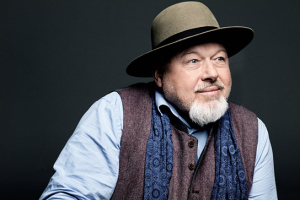Gallery
All Pictures (4)Biography
Rainer Kaufmann, born on 6 June 1959 in Frankfurt am Main, initially completed an apprenticeship as a carpenter, studied German at the Goethe University in Frankfurt and then successfully applied to the Munich Academy for Television and Film (HFF). His first short film "Salz ist das Leben" (1989) was awarded the Regienachwuchs-Förderpreis of the city of Munich and nominated for the Bundeskurzfilmpreis. His surrealistic short film "Der schönste Busen der Welt" (1990) also celebrated festival successes, found a broad cinema audience as the supporting film for Katja von Garnier's "Abgeschminkt" and received four nominations for the German Short Film Award. Kaufmann's feature film debut, the socio-critical TV drama "Dann eben mit Gewalt" (1993), is also highly acclaimed by critics and is awarded the European Television Prize.
In the nineties, Rainer Kaufmann became one of the most popular representatives of the "New German (Comedy) Cinema" with box-office hits such as "Stadtgespräch" ("Talk of the Town") and "Die Apothekerin" ("The Pharmacist") as well as the Max Ophüls Prize-winning "One of My Eldest Friends" - whose works, mainly literary film adaptations, nevertheless met with rather ambivalent reactions from critics. After the Ingrid Noll adaptation "Kalt ist der Abendhauch" ("Cold Is the Breath of Evening", 2000), Kaufmann increasingly turned to television, staging successful TV series and TV plays. In 2007, he returned as a cinema director with the highly acclaimed Martin Walser film "Ein fliehendes Pferd" ("A fleeing horse") with its top-class cast.
In the following years Kaufmann again worked exclusively for television where he shot many highly acclaimed and partly award-winning TV plays. For example, the tragicomedy "Ein stark Abgang" (2008), with Bruno Ganz as the misanthropic writer who, during a reading tour, is in constant duel with his nutritionist (Monica Bleibtreu).
With "Erntedank" (2009) Kaufmann staged the first crime thriller about the cases of Chief Commissioner Kluftinger (Herbert Knaup), based on novels by Michael Kobr and Volker Klüpfel. Kaufmann also directed the "Kluftinger" capers "Milchgeld" (2012) and "Seegrund" (2013). A series also developed from the tragicomic, upper middle-class family story "Das Beste kommt erst" (2008), with the sequels "In den besten Familien" (2012), "Beste Bescherung" (2013) and "Das beste aller Leben" (2015).
In between, Kaufmann shot the Grimme Award-winning drama "In aller Stille" (2010) with Nina Kunzendorf about child abuse and infanticide within the family. His regional thriller "Föhnlage. Ein Alpenkrimi" (2011), with Martin Feifel as investigator, won the Bernd Burgemeister Prize for Best Television Film at the Munich Film Festival. The friendship story "Blaubeerblau" (2011), about an architect who meets a schoolmate in a hospice, received the audience award at the Grimme Award.
The investigative drama "Operation Zucker" (2012), about child trafficking and child prostitution as well as the involvement of high-ranking dignitaries in paedophile circles, received a great deal of attention. The intensive film, inspired among other things by real life events ("Sachsensumpf"), had to be shortened slightly for prime-time broadcast. It received outstanding reviews, was nominated for the Grimme Award and won the German Television Prize for Best Television Film; main actress Nadja Uhl was awarded the Bavarian Television Prize, among others. Sherry Hormann directed the sequel "Operation Zucker: Jagdgesellschaft" (2016).
After "Operation Zucker", Kaufmann staged lighter material such as the above-mentioned "Das Beste" films and the lesbian love story "Ich will Dich" ("Unexpected", 2014). He was also the director of episodes of "Polizeiruf 110" ("Nachtdienst", 2017), "Tatort" ("Die Liebe ein seltsames Spiel", 2017) and "Bella Block" ("Am Abgrund", 2018). His dark drama "Der Polizist und das Mädchen" (2018), about a provincial policeman who becomes a multiple murderer in order to cover up a hit and run, also received good reviews.
With the divorce comedy "Und wer nimmt den Hund?" ("Lost in Separation") Kaufmann again presented a feature film at the Munich Film Festival 2019 - his first in twelve years. The film was released in August 2019. His next feature film, "Eine ganz heiße Nummer 2.0", a sequel to Markus Goller's successful comedy from 2011, will be released in October 2019.
The director then realized three TV productions in quick succession: the "Polizeiruf 110" crime thriller episode "Heilig sollt ihr sein!", the tragicomedy "Mutter kündigt" (2021) with Maren Kroymann, and the highly acclaimed "Tatort" crime thriller "Murot und das Prinzip Hoffnung", revolvoing around Wiesbaden Commissioner Felix Murot. The TV drama "Laufen" (2022), about a woman (Anna Schudt) coming to terms with her grief over her partner taking his own life, also received very positive reviews.
In the fall of 2022, Kaufmann began shooting a new feature film, the comedy "Weißt du noch" ("Remember Me"), starring Senta Berger and Günther Maria Halmer as a long-time married couple who use a miracle pill to remember the pleasant and also less pleasant moments of their life together.
